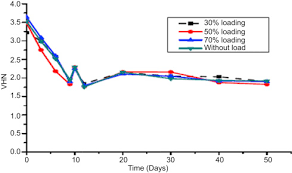How to Calculate and Solve for Vicker’s Hardness Number | Mechanical Properties
Last Updated on June 8, 2024
The image above represents vicker’s hardness number. To calculate vicker’s hardness number, two essential parameters are needed and these parameters are Load Applied (P) and Diameter of Indenter (d).
The formula for calculating vicker’s hardness number:
HV = 1.854P/d²
Where:
HV = Vicker’s Hardness Number
P = Load Applied
d = Diameter of Indenter
Given an example;
Find the vicker’s hardness number when the load applied is 14 and the diameter of indenter is 2.
This implies that;
P = Load Applied = 14
d = Diameter of Indenter = 2
HV = 1.854P/d²
That is, HV = 1.854(14)/(2)²
HV = (25.95)/(4)
HV = 6.489
Therefore, the vicker’s hardness number is 6.489.
Calculating the Load Applied when the Vicker’s Hardness Number and the Diameter of Indenter are Given
P = HV(d2) / 1.854
Where:
P = Load Applied
HV = Vicker’s Hardness Number
d = Diameter of Indenter
Let’s solve an example;
Given that, the vicker’s hardness number is 6 and the diamter of indenter is 4. Find the load applied?
This implies that;
HV = Vicker’s Hardness Number = 6
d = Diameter of Indenter = 4
P = HV(d2) / 1.854
P = 6(42) / 1.854
So, P = 6(16) / 1.854
P = 96 / 1.854
P = 51.77
Therefore, the load applied is 51.77.
Read more: How to Calculate and Solve for Knoop Hardness Number | Mechanical Properties
Calculating the Diameter of Indenter when the Vicker’s Hardness Number and the Load Applied are Given
d = √1.854P / HV
Where:
d = Diameter of Indenter
HV = Vicker’s Hardness Number
P = Load Applied
Let’s solve an example;
Find the diameter of indenter when the vicker’s hardness number is 20 and the load applied is 2.
This implies that;
HV = Vicker’s Hardness Number = 20
P = Load Applied = 2
d = √1.854P / HV
d = √1.854(2) / 20
So, d = √3.708 / 20
d = √0.1854
d = 0.430
Therefore, the diameter of indenter is 0.430.
Read more: How to Calculate and Solve for Brinell Hardness Number | Mechanical Properties
How to Calculate Vicker’s Hardness Number Using Nickzom Calculator
Nickzom Calculator – The Calculator Encyclopedia is capable of calculating the vicker’s hardness number.
To get the answer and workings of the vicker’s hardness number using the Nickzom Calculator – The Calculator Encyclopedia. First, you need to obtain the app.
You can get this app via any of these means:
Web – https://www.nickzom.org/calculator-plus
To get access to the professional version via web, you need to register and subscribe to have utter access to all functionalities.
You can also try the demo version via https://www.nickzom.org/calculator
Android (Paid) – https://play.google.com/store/apps/details?id=org.nickzom.nickzomcalculator
Android (Free) – https://play.google.com/store/apps/details?id=com.nickzom.nickzomcalculator
Apple (Paid) – https://itunes.apple.com/us/app/nickzom-calculator/id1331162702?mt=8
Once, you have obtained the calculator encyclopedia app, proceed to the Calculator Map, then click on Materials and Metallurgical under Engineering.
Now, Click on Mechanical Properties under Materials and Metallurgical
Now, Click on Vicker’s Hardness Number under Mechanical Properties
The screenshot below displays the page or activity to enter your values, to get the answer for the vicker’s hardness number according to the respective parameter which is the Load Applied (P) and Diameter of Indenter (d).
Now, enter the values appropriately and accordingly for the parameters as required by the Load Applied (P) is 14 and Diameter of Indenter (d) is 2.
Finally, Click on Calculate
As you can see from the screenshot above, Nickzom Calculator– The Calculator Encyclopedia solves for the vicker’s hardness number and presents the formula, workings and steps too.











